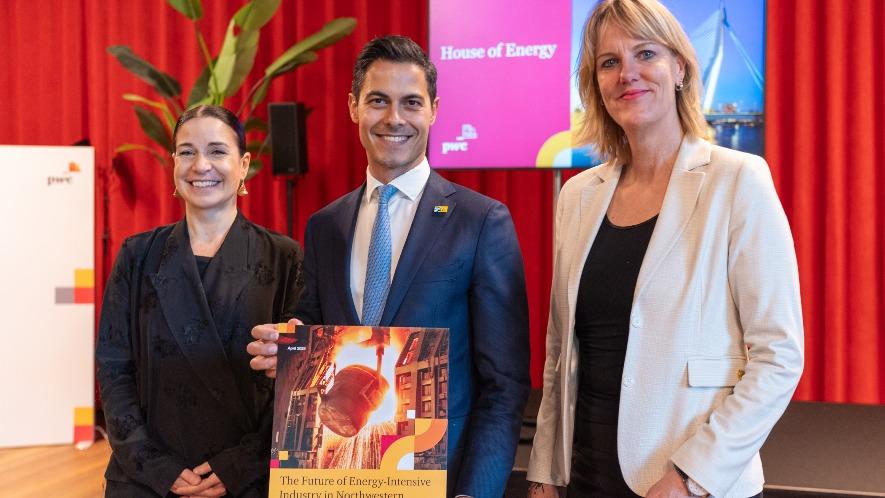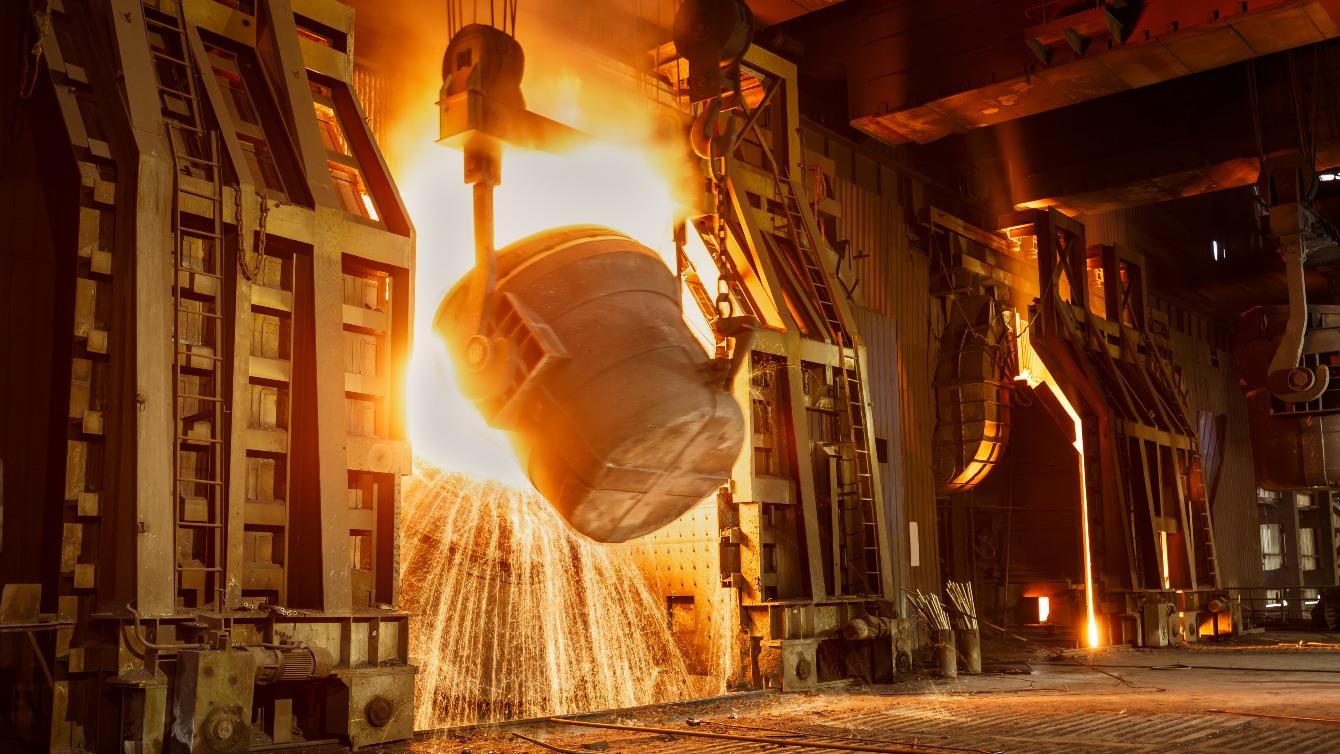That is one of the main conclusions from the PwC report "The future of energy-intensive industry in Northwestern Europe: a balancing act," which was presented to demissionary Minister Rob Jetten for Climate and Energy by Tezel during the World Energy Congress 2024 in Rotterdam. Upon receiving the report, Jetten emphasized the importance of having a competitive and sustainable industry in the region to accelerate the energy transition and achieve climate goals. 'This requires drastic choices, and the world is now looking to Europe to take the lead,' said Jetten.

Gülbahar Tezel, head of PwC's Energy Transition Think Tank and Agnes Koops, CEO PwC Netherlands, present the research report to Minister Rob Jetten.
NW Europe: production of sustainable energy relatively expensive
The report analyzes the future possibilities of the industry in countries such as the Netherlands, Belgium, Luxembourg, Germany, and Denmark. This industry is facing challenges due to the war in Ukraine, high prices for liquefied gas (LNG), and European climate requirements, which result in high energy costs.
The production of sustainable energy is also relatively expensive in this region. Due to limited space and a cool climate, Northwest Europe is currently less suitable for generating energy from sources such as onshore wind and solar power. Energy from offshore wind is an option, but an expensive one, as outlined in the report. Tezel states, "Other regions, such as Southern Europe, the Middle East, North Africa, the US, and Australia, can produce clean energy much more affordably."
The report identifies cheaper alternatives for the production of energy-intensive industries such as steel, fertilizers, and chemicals. For example, importing green hydrogen is an option, but it is also very expensive. Partially relocating energy-intensive processes and then importing the products in the form of semi-finished goods is not much cheaper. Tezel explains, "If you only look at energy costs and redesign the world, placing the entire production outside of Northwest Europe is the cheapest option among all the possibilities examined."
Do not underestimate the energy transition learning effects
However, there is no reason for pessimism, emphasizes Tezel, who is not only PwC's Energy Transition Think Tank lead but also a professor of Economics at Tilburg University. "We must not underestimate the learning effects that occur during the scaling up of the energy transition. They are difficult to predict, but based on numerous examples from the past, we should certainly not exclude the possibility of significant economies of scale, improving our processes, and important technological breakthroughs happening at the same time."
"We see great examples in the production of solar panels and wind turbines where there have been enormous efficiency gains. Such learning effects will determine future energy costs and the availability of affordable sustainable energy in the region. Learning effects are achievable, as we can see from the examples of solar panels and wind turbines," says Tezel.
According to the report, there are also other factors that make industrial companies prefer to stay in Northwestern Europe. In this region, the risks of capital-intensive investments are relatively lower than in less stable regions. Other advantages include a well-developed infrastructure, such as roads, railways, ports, and access to a robust energy infrastructure. Currently, this infrastructure mainly focuses on gas and electricity, but in the future, the infrastructure for hydrogen and CO₂ capture and storage will become increasingly important. A well-educated workforce is also important for efficient operations.
It is no coincidence that the Northwestern European countries score high on the lists of most competitive economies, such as those of the World Economic Forum and the IMD Business School. The Netherlands ranks in the top five on both lists. "These factors are important for attractiveness as a location," says Tezel. "They mitigate the disadvantages of high energy costs."
"Policymakers really need to determine what kind of economy we want to achieve and what societal interests we want to pursue. It is a balancing act of the highest order."
Gülbahar Tezellead Energy Transition Think Tank and partner Strategy&A balancing act for policymakers
In the global long-term game, the government also plays an important role. The government is currently facing a balancing act, according to the PwC report. Policymakers must decide what kind of economy Northwestern Europe is best served by in the long term. To make such an economy flourish, it is a government's role to ensure a level playing field for businesses as much as possible. It is also crucial to invest in favorable location factors, such as education, infrastructure, and R&D.
The question then arises as to how such an economy can best obtain crucial products such as steel, chemicals, and fertilizers. Which parts of the energy-intensive industry should perhaps remain because they involve public interests? One public interest may be that Northwestern Europe considers it important not to become too dependent on foreign countries.
The report presents a number of choices for policymakers, along with their advantages and disadvantages. Subsidizing industrial companies is a sensitive issue, not least for economists. One reason to do so is to facilitate the breeding ground for learning effects.
Tezel: "For the protection of public interests, the government can consider providing financial support. You have to be very careful with this because you don't want to engage in protectionism. So with every subsidy, you have to balance between the never completely certain benefits of protecting public interests and the disadvantages of supporting an activity that may not be viable in the long term. In any case, be clear and transparent about the public interests that the subsidy is aimed at and compare financial support with other policy instruments."
"If nothing happens, industries will disappear"
Doing nothing is not an option, emphasizes Tezel. "If nothing happens, industries will disappear. Not straight away, because the factories are far too complex for that. But new investments for the coming decades may be less likely to take place in Northwestern Europe. Policymakers really need to determine what kind of economy we want to achieve and what societal interests we want to pursue. It is a balancing act of the highest order. But with a well-considered policy mix, I am convinced that we can maintain a clean and vital energy-intensive industry."
Interested to know more about the future of the energy-intensive industry?
Contact us

Gülbahar Tezel
Partner Strategy&, Lead Denktank Energietransitie, PwC Netherlands
Tel: +31 (0)61 391 56 71

Energy - Utilities - Resources Industry Leader, PwC Netherlands
Tel: +31 (0)61 003 87 14
















